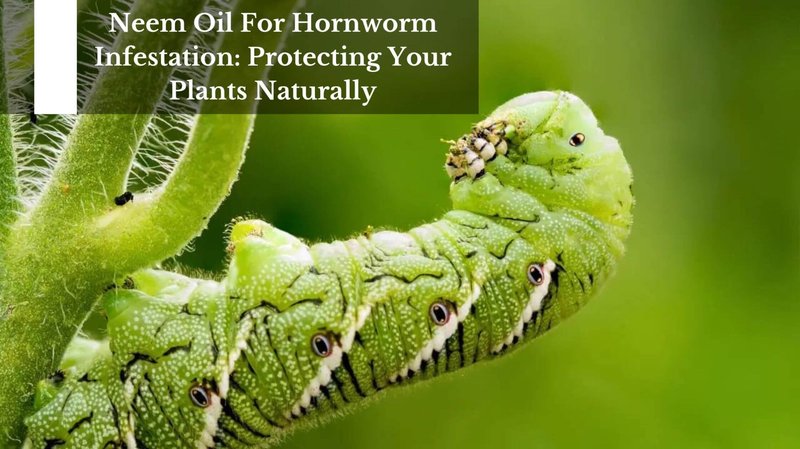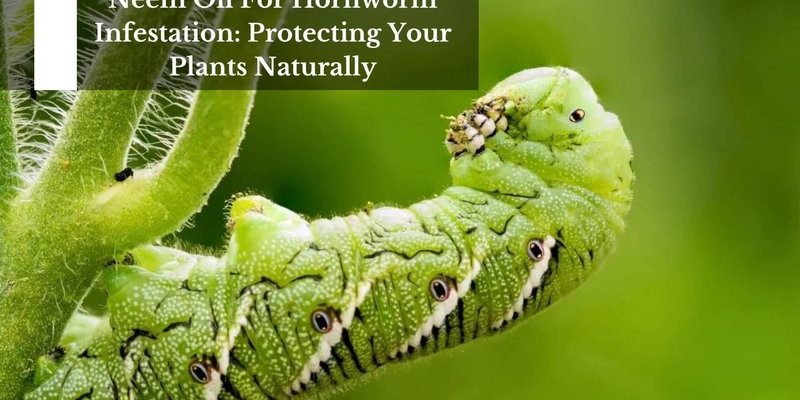
Think of neem oil as the superhero in your garden’s story. Just like a friendly shield against those pests, it helps protect your plants without the harsh chemicals that many commercial pesticides bring. Imagine sipping a cup of coffee while we dive into how neem oil works, how to use it effectively, and why it’s a fantastic choice for taking on those pesky hornworms.
What Are Hornworm Larvae?
Hornworm larvae are the immature stages of moths belonging to the Sphingidae family. You might have seen them before: they’re large, green, and can grow up to 4 inches long. Their size isn’t the only thing that’s intimidating; they have a horn-like projection on their rear end, which makes them look a bit menacing. But honestly, what’s more alarming is how quickly they can nibble through your precious plants.
These larvae typically feed on solanaceous plants—think tomatoes, peppers, and eggplants. A single hornworm can consume up to 4 square feet of foliage in just one week! That’s enough to scare any gardener. If you’ve noticed leaves disappearing overnight, the chances are high that hornworms are to blame.
Understanding hornworm larvae is crucial for gardeners. The more you know, the better prepared you’ll be to protect your plants from this common garden pest. Unlike some pests that appear all season long, hornworms can come in quickly and leave a trail of destruction just as fast.
How Neem Oil Works
Neem oil is derived from the seeds of the neem tree, native to India. The oil contains compounds called azadirachtin, which is known for its ability to disrupt the life cycle of many pests. Think of azadirachtin as a powerful little disruptor that sends hornworms into a whirl. It affects their ability to feed, grow, and reproduce, leading to their eventual demise.
Here’s the thing: neem oil doesn’t kill pests on contact like some pesticides. Instead, it works more like a deterrent. When hornworms come into contact with neem oil, they’ll think twice about munching on your plants. Also, if they ingest it, their growth is stunted, and they eventually die. This slow but effective approach means you’re protecting your plants without causing harm to beneficial insects like bees and ladybugs.
When applying neem oil, it’s essential to remember that consistency is key. Repeated applications every 7 to 14 days can keep those hornworm numbers in check. You might be wondering how often you should spray, and it really depends on how severe your infestation is.
How to Apply Neem Oil
Applying neem oil isn’t as tricky as it may sound. Here’s a simple step-by-step guide to get you started:
- Choose Your Neem Oil: Look for a high-quality, cold-pressed neem oil to ensure the best results.
- Mix the Solution: Combine 2 tablespoons of neem oil with 1 gallon of water. If you want to enhance the mix, add a few drops of dish soap to help the oil blend better.
- Test a Small Area: Before going all out, spray a small section of your plants to ensure they don’t react negatively.
- Spray Thoroughly: Use a spray bottle to coat both the tops and undersides of the leaves. Hornworms often hide on the underside, so don’t skip that step!
- Repeat as Needed: Reapply every 7-14 days, especially after rain, to maintain protection.
It’s that easy! Just remember not to spray neem oil when the sun is directly shining on your plants, as this can cause burning.
Benefits of Neem Oil
Using neem oil to tackle hornworm larvae comes with a host of benefits that make it a favorite among gardeners. Here are some compelling reasons to give it a try:
1. **Natural and Non-Toxic:** Neem oil is a natural pesticide, making it safe for your family and pets when used correctly. You can feel good about using it around your garden without worrying about harmful chemicals.
2. **Works on Various Pests:** While hornworms are a primary target, neem oil isn’t picky. It can also deter other pests like aphids, spider mites, and whiteflies. Think of it as a multipurpose defender in your gardening arsenal.
3. **Helps With Plant Health:** Beyond pest control, neem oil has antifungal and antibacterial properties that can help your plants recover from diseases and thrive. It’s like giving your plants a little extra support during tough times.
4. **Environmentally Friendly:** Using neem oil means you’re taking a step toward eco-friendly gardening. It’s biodegradable and won’t linger in the environment, unlike many synthetic pesticides.
Let’s be real: who wouldn’t want to protect their garden with something so beneficial?
Alternative Methods for Hornworm Control
While neem oil is a fantastic option for managing hornworm larvae, it’s not the only tool in your toolbox. Here are a few other methods you might consider:
- Handpicking: It may sound tedious, but physically removing hornworms can be effective. They’re relatively large and easy to spot. Just wear gloves and toss them in a bucket of soapy water.
- Beneficial Insects: Introduce natural predators like parasitic wasps, which lay eggs in hornworms. These little helpers will do the work for you!
- Plant Companions: Some plants can deter hornworms. For instance, marigolds and basil can confuse pests and protect your crops.
- Insecticidal Soap: This is another natural alternative that can help control hornworm populations. It works similarly to neem oil but may not be as effective against larger infestations.
Finding what works best for your garden may take some trial and error, but that’s all part of the fun!
Safety Considerations When Using Neem Oil
While neem oil is generally safe, there are a few precautions to keep in mind:
– **Avoid Over-Application:** More isn’t always better. Overusing neem oil can lead to build-up on the plants and may harm beneficial insects.
– **Check Compatibility:** Not all plants react well to neem oil. As mentioned, do a small test first to prevent any unwanted surprises.
– **Store Properly:** Keep your neem oil in a cool, dark place. Proper storage can help extend its shelf life and effectiveness.
– **Follow Usage Guidelines:** Always read the instructions on the product label. Following the manufacturer’s guidelines ensures you’re using neem oil safely and effectively.
By taking these considerations into account, you can enjoy the benefits of neem oil while minimizing any risks.
So there you have it! Neem oil is a powerful ally in the battle against hornworm larvae. With its natural composition, ease of use, and multiple benefits, it’s a fantastic choice for anyone wanting to protect their garden sustainably. Whether you choose to spritz your plants with neem oil or try out other methods, remember that vigilance is key. The moment you spot those pesky hornworms, act quickly to mitigate their damage.
As you sip your coffee and watch your plants thrive, you can rest easy knowing you have a natural solution in your gardening toolkit. Happy gardening!

